Mar 26 2021 - 12:00pm to 1:00pm
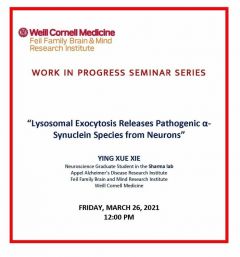
“Lysosomal Exocytosis Releases Pathogenic -Synuclein Species from Neurons”
Ying Xue Xie, Graduate Student in the Sharma lab, Appel Alzheimer’s Disease Research Institute, BMRI, WCM
Mar 25 2021 - 4:00pm to 5:00pm

Oliver Rollins, PhD, Assistant Professor of Sociology, University of Louisville
While race, and especially its mistaken interpretation as a biological reality, has played a key role in the production of biological understandings of violence, recent research on violence using neuroimaging technologies reveals a conspicuous absence of race. Despite these efforts to move away from race, today’s neuroscience of violence is (still) haunted by what I call the “taboo of race.” In this talk, I...
Mar 19 2021 - 12:00pm to 1:00pm
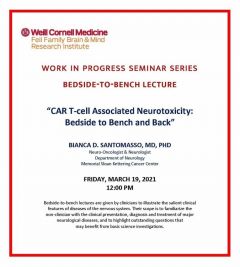
"CAR T-cell Associated Neurotoxicity: Bedside to Bench and Back"
Bianca D. Santomasso, MD, PhD, Department of Neurology, Memorial Sloan Kettering Cancer Center
Mar 12 2021 - 12:00pm to 1:00pm
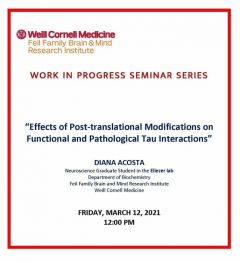
“Effects of Post-translational Modifications on Functional and Pathological Tau Interactions”
Diana Acosta, Neuroscience Graduate Student in the Eliezer lab, Departments of Biochemistry and BMRI, WCM
Mar 5 2021 - 12:00pm to 1:00pm
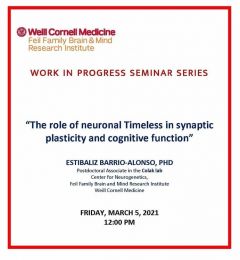
“The role of neuronal Timeless in synaptic plasticity and cognitive function”
Estibaliz Barrio-Alonso, PhD, Postdoctoral Associate in the Colak lab, Center for Neurogenetics, BMRI, WCM
Mar 4 2021 - 4:00pm to 5:00pm

Afonso C. Silva, Ph.D.
Endowed Chair in Translational Neuroimaging
Professor, Dept. of Neurobiology
University of Pittsburgh Brain Institute
Abstract: The common marmoset (Callithrix jacchus) is a small New World monkey that has gained significant recent interest in neuroscience research, due in great part for its compatibility with gene editing techniques, but also due to its tremendous versatility as an experimental animal model. As primates, marmosets retain the typical anatomical and...
Feb 26 2021 - 12:00pm to 1:00pm
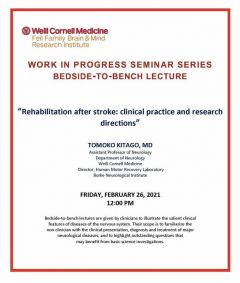
“Rehabilitation after stroke: clinical practice and research directions"
Tomoko Kitago, MD, Assistant Professor of Neurology, Department of Neurology, WCM, Director, Human Motor Recovery Laboratory, Burke Neurological Institute
Feb 25 2021 - 4:00pm to 5:00pm

Helen Bateup, PhD
Associate Professor of Neurobiology
UC Berkeley
Research in my lab broadly aims to understand the cellular and molecular basis of neuropsychiatric disorders. We have a particular interest in “mTORopathies”, which are developmental brain disorders caused by mutations in the mTOR signaling pathway that lead to epilepsy, intellectual disability, and increased risk for autism spectrum disorder. To elucidate disease mechanisms for these disorders, we use genetically-defined...
Feb 19 2021 - 12:00pm to 1:00pm
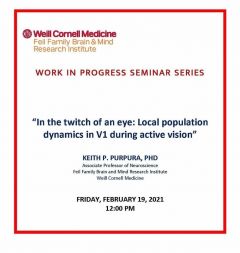
“In the twitch of an eye: modulation of brain rhythms during active vision”
Keith P. Purpura, PhD, Associate Professor of Neuroscience, BMRI, WCM
Feb 18 2021 - 4:00pm to 5:00pm

David Fitzpatrick PhD
Scientific Director and CEO, Max Planck Florida Institute for Neuroscience
Abstract:
Ultimately, understanding cortical circuit function and development requires elucidating the functional synaptic architecture of individual neurons—characterizing the functional properties of a neuron’s synaptic inputs, their strength, their source, how they are arranged within the dendritic field, and how this relates to somatic output. To address this challenging problem, we have...

